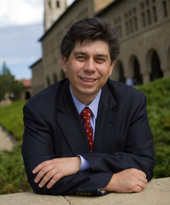In 2005, a series of chilling death threats compelled award-winning Colombian journalist Daniel Coronell to leave Bogotá with his family for what ended up being a two-year stay in California. Today, more than three years after his return from exile, Coronell and his family are moving back to the States, this time by choice. CPJ spoke to him last week about how his return U.S. to take on a high-level position at a major TV network compares to his exile in 2005, and the press freedom conditions he’s leaving behind in Colombia.
Univisión announced in late January that Coronell, news director for the Bogotá-based national news program “Noticias Uno,” had been named vice president of network news–a professional step forward that requires him to move to Miami.
For Coronell, life in Florida will be a welcome change, he said, especially for his children, ages 4 and 12, whose childhoods, he feels, have been curbed by security measures required by his and his wife’s work as investigative journalists in Colombia. In 2005, amid mounting threats (in one instance a funeral wreath was sent to his home), Coronell accepted a year-long Knight Senior Research fellowship at Stanford University and moved his family to Palo Alto, California. In this bucolic setting, Coronell remembers, his daughter was able to be a normal kid, learning to ride a bike and playing outdoors. Coronell was also able to breathe more freely.
In 2007, after extending his stay in the U.S an additional year through an academic placement at UC Berkeley, the Coronells returned reluctantly to the bodyguards and bulletproof vehicles that characterized their life in Colombia. He picked up his investigative work where he left off, conducting investigations that brought to light high-level government corruption, some of which implicated family members of then-President Álvaro Uribe.
The threats and criminal lawsuits also picked back up, but at a slower pace. Coronell said he believes the international visibility his case had received from international groups like CPJ created a political shield that enabled him to carry out his investigations without the threats ever reaching their 2005 intensity. During this period, his work at “Noticias Uno” garnered him four journalism awards and his column for the newsmagazine Semana was voted the most read by opinion-leaders in Colombia.
Despite the relative freedom with which Coronell has been able to report the news since his return from exile, he is hesitant to claim major improvements in press freedom conditions in Colombia. A reduction in journalist killings has been accompanied by an increase in self-censorship among journalists, he said. He also cited new President Juan Manuel Santos’ attitude toward the media as an improvement over that of Uribe, who maintained a contentious relationship with the media during his eight years in office, CPJ research shows.
On the airplane to Miami last month, Coronell reflected on his 2005 departure and the different position he finds himself in today. He remembered leaving Bogotá in tears in August of 2005–his entire life packed up into three suitcases–and emotionally spent from the latest round of threats, some of which had targeted his young daughter.
This time, instead of fleeing a life-threatening situation and depending on the support of others, Coronell will work with top journalists in the U.S., running a 250-member news team at Univisión. From the vantage point of the U.S., Coronell said, he sees a unique opportunity to investigate sensitive issues in Latin America, reporting on stories that local outlets may shy away from in fear of retaliation. At the same time, he said he feels a responsibility to provide Hispanic immigrants with access to the crucial information that will enable them to be influential members of society. Whether in Bogotá or Miami, Coronell sees his role as unchanged: that of a watchdog for democracy and a spokesman for the people.
